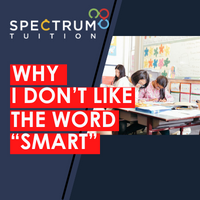I don’t like the word “smart” because, when you think about it, it doesn’t really mean much. We use “smart” as a stand in word for some mysterious quality that allows students to remember information, solve problems and get good marks. What’s worse is that, because it is such a vague and ambiguous term, the word “smart” is often thrown around as an excuse. Students who do not achieve their goals complain that “I’m just not smart enough,” while other students thing “I’m smart already, so I don’t have to work as hard as other students.”
The main problem with the word “smart” is that it implies that our success, our failure and our performance are out of our control. We are either born smart or we are not, and there’s not much we can do about it. That’s why I’d like us to stop thinking about our students and our children as “smart.” I would like to suggest 4 better words that can be used to describe successful students: words that remind us that we are all capable of achieving success.
1. Experienced
Experienced students are students who have seen it all. When they are given a maths problem, they have already done a similar question before. When they are doing a reading comprehension, they have seen all the words before in different contexts. When they are trying to write an essay, they know exactly how to structure it because they have done it dozens of times before. Students aren’t born with these experiences; they build them up through hard work. Naturally talented students will never be able to compete against students who complete all their homework, read a wide variety of books and newspapers, practice their writing and constantly strive to expand their experience.
2. Flexible
Flexible students are students who never give up. If they are unsuccessful with one way of solving a problem, they try another and another and another until they get the result they’re after. These are the students that, if stranded in the middle of a forest with nothing but a magnifying glass and a piece of string, would figure out a way to get home. When teaching VCE maths, I see a lot of intelligent students who give up too easily when faced with an unfamiliar problem. One of the best skills a student can learn is the ability to not give up too easily. If they’re stuck on a difficult maths problem, encourage them to brainstorm all the different possible ways of solving it and then try each of them, one by one. If they are struggling to write a story or an essay, encourage them to imagine how other people might view the subject from other perspectives.
3. Motivated
99% of the time, if you compare a naturally gifted student who doesn’t care about schoolwork with an average student who is driven to learn, it is the motivated student that will ultimately be more successful. Motivation is truly one of the most amazing skills that a student can develop. It’s the one thing that Albert Einstein, Steven Hawkins, Michael Jordan, Steve Jobs, Bill Gates and William Shakespeare all had in common: the ability to set personal goals and work hard to achieve them. And this is something that every student can learn. They just have to actively think about what they want, how they can get it, and what they have to do today to start achieving their goals.
4. Curious
When children are very young, they are always asking “why?” Why is the sky blue? Why do people get old? Why can’t dogs talk? As they get older, some students stop asking why; others don’t. Successful students are often the curious ones: the ones that are always eager to learn more. These are the students who are more likely to get a more complex, and more involved understanding of everything they learn, because they are active in their learning. You should encourage your child’s curiosity; if they ask you how many stars there are in the Milky Way, or what year the Queen was born, or how to spell “constitutionally”, encourage them to search for an answer. If you can get them excited and curious about learning more about the world, the rest will take care of itself.
Let me know what you think. Do you have any words you prefer to “smart”? What qualities do you think makes a student successful?


